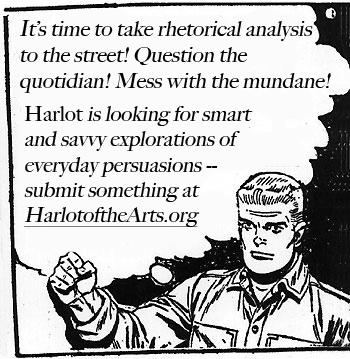I just read “Is Language A Window into Human Nature” on Space Collective, in which the author argues that language must be reinvented in order to address our new technological age and the obstacles of this age. I find this interesting, because I’ve been having a difficult time describing what exactly Harlot is in the minutiae. Yes, we publish articles (and mighty nifty ones, I might add), but we’re not just another journal. Heck no, we’re specifically geared toward interactivity and community–through comments, the blog, the wiki. We’re a “place” and a “space” for dialogue. So, why is it that I can’t stop using those two words?
The hesitation I have to use certain words (ie publication, journal, magazine) stems from the connotation of those words. I’m not a big fan of the word “forum” either, simply because I don’t want it confused with bboards or message boards. We are online, after all, and that could easily be misinterpreted by the web savvy.
I wonder if we require our own special word. Hmm. We’re a publication and a community, so we’re a publunity? We’re a journal and a space, so we’re a jourace? Oh, I know, we’re a mag, a blog, and a wiki, so we’re a mogi. Ha, sounds like a band name.
None of these are going to catch on. First of all, they’re terrible, and secondly, they don’t carry any context for readers. That’s what makes creating a new language so difficult. If it doesn’t happen organically, then it’s hard to force on anybody, because no one knows what you’re talking about and they don’t really care to.
Do I wish for one perfect word to encompass all that Harlot is and will be? Absolutely. It’d make my job easier, but at the same time, isn’t it my job to try and attain that–to be active in the movement that is Harlot and push for the convergence of multiple forms of contribution. To encourage the amalgamation of top-down and bottom-up voices in this community? So, what do we call it? Other than a “place” or a “space” or simply Harlot. An interactive online publication? A web-mag and community? A rhetorical realm for the populice? How do you describe all that you are in one simple, understandable word if that word has yet to exist yet?




